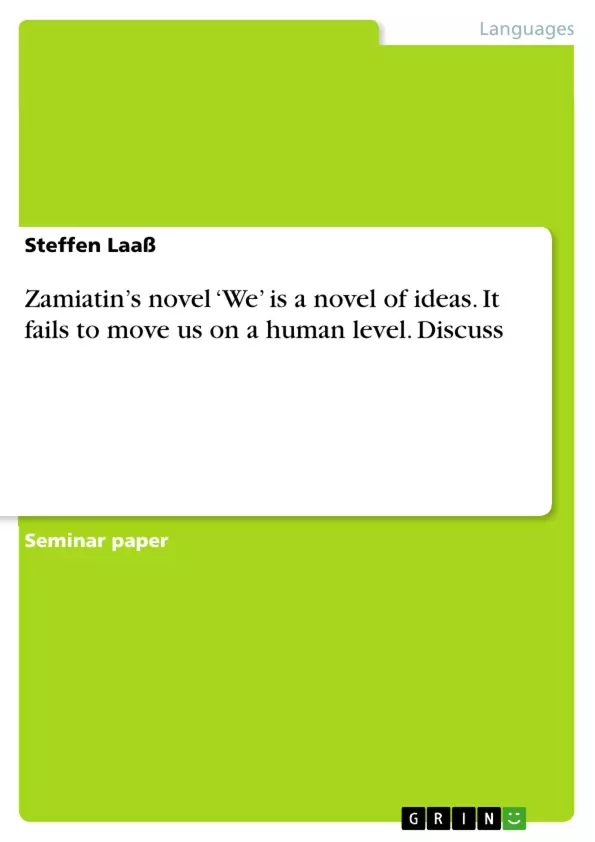We begin to scrutinize the nature of the terms ‘idea’ and ‘human’, and continue to look at selected notions and images in detail. As all concepts we will touch upon are quite ‘slippery’, I offer one or two definitions that could fit into the literary context of We. They will usually serve as the bedrock for our elaboration.
It is important to mention that I decided to approach the novel from a slightly philosophical rather than a pure literary or linguistic angle. This perspective allows us to go far beyond the ideas presented in We. It should also be noted that my views expressed in this seminar paper are based on my first and second readings of We. A third or fourth ‘exploration’ would probably produce completely different readings.
To stimulate follow-up analyses, I start every chapter with a brief sound quotation – either taken from the novel itself or from secondary literature. I hope to provide an interesting, comprehensible, and entertaining tour through the literary world of Zamyatin’s masterpiece We.
Table of Contents
- Introduction
- The concept of 'idea'
- What is 'human'?
- Happiness and Freedom
- Utopian Perfection
- Beauty
- Religion and the Idea of Soul and Imagination
- Depersonalization and Dehumanization
- We - a novel of absurdities?
- Conclusion
- Bibliography
Objectives and Key Themes
This essay analyzes Yevgeny Zamyatin's novel We (1924), examining the inherent images presented within its supposedly perfect world. The primary objective is to investigate whether We functions as a novel of ideas and if it ultimately engages with the reader on a human level. The analysis explores concepts of "idea" and "human" and delves into specific notions and images presented in the novel.
- The nature of "idea" and its application in Zamyatin's fictional world
- The definition of "human" and its relevance to the characters and narrative
- The relationship between utopian perfection and individual freedom
- The role of religion, imagination, and soul in a dehumanized society
- The exploration of absurdity and its impact on the reader's understanding
Chapter Summaries
The Introduction sets the context for the essay, establishing the primary arguments and the approach taken. The second chapter delves into the concept of "idea" in relation to We, examining the novel's unique narrative structure and its presentation of both realistic and absurd ideas. The third chapter explores the definition of "human" and its relevance to the characters and their actions within the utopian society depicted in the novel.
Keywords
This analysis focuses on the key concepts of "idea," "human," utopian society, freedom, happiness, religion, imagination, depersonalization, dehumanization, and absurdity. The analysis examines these themes through the lens of Zamyatin's fictional world and its relationship to the reader's own understanding and experience.
Frequently Asked Questions
Is Zamyatin's "We" considered a "novel of ideas"?
Yes, the essay explores this classification, analyzing how the novel presents philosophical and utopian concepts through its narrative structure.
Does the novel fail to connect on a human level?
This is a central question of the essay; it examines whether the characters and the "perfect" society are too abstract to move the reader emotionally.
How are happiness and freedom portrayed in the book?
The analysis looks at the trade-off between utopian stability (happiness) and individual autonomy (freedom) within the One State.
What role does "depersonalization" play in the story?
The essay discusses how the society in "We" attempts to strip individuals of their unique identity and soul to achieve mathematical perfection.
Is "We" a novel of absurdities?
The author investigates the use of absurd elements and images to challenge the reader's understanding of reality and utopian logic.
- Quote paper
- Steffen Laaß (Author), 2005, Zamiatin’s novel ‘We’ is a novel of ideas. It fails to move us on a human level. Discuss, Munich, GRIN Verlag, https://www.grin.com/document/114248



